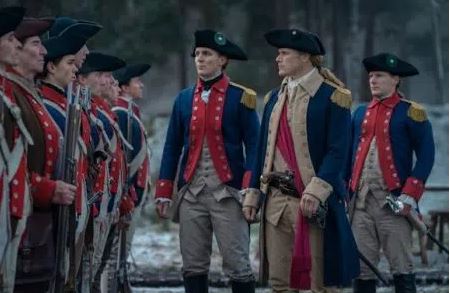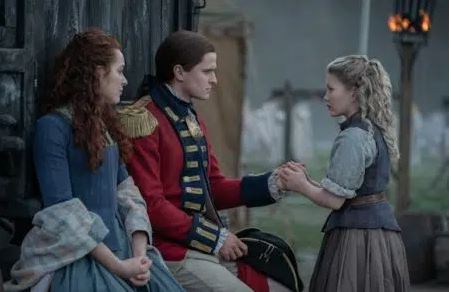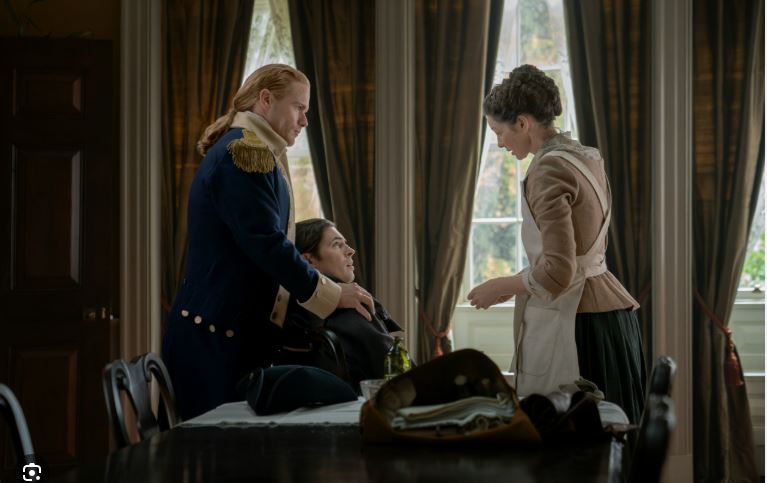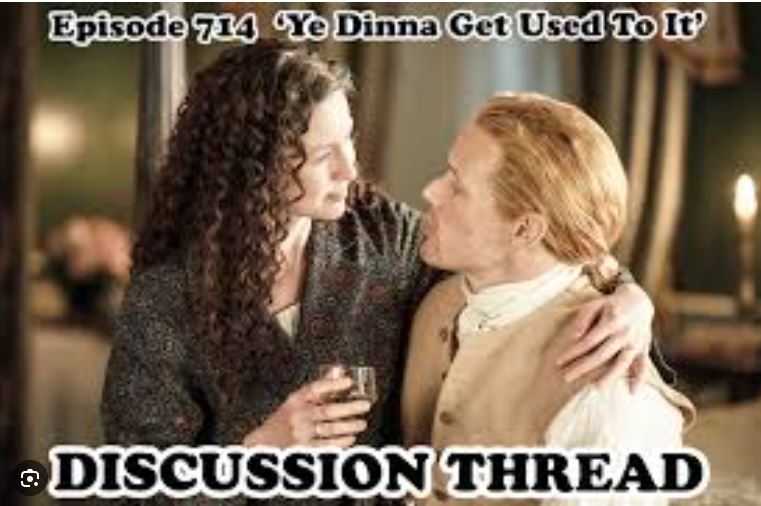The theme I pulled out of this week’s episode, Ye Dinna Get Used To It, feels very appropriate today. More than anything else, I saw the idea of treating those who haven’t had the same advantages in life as equals, the idea of protection, as the overriding themes. And yesterday, we got word that Jimmy Carter, former US President, had died at the age of 100. I won’t get into politics at all, but while he may not have been an ideal leader (although he did an awful lot as President that you may not be aware of), he certainly embodied the best qualities of humanity – empathy, caring, faith, gratitude, kindness. And I saw much of that in this week’s episode.
First, I want to apologize for the lateness of this note to you. I (and other bloggers) usually get the week’s episode from Starz on Mondays. But last week, it came out Thursday, probably because of the holiday, and I was visiting family, then had two days of travel. Funny detail – I didn’t notice this the first time I watched on Thursday night, but the title card of the screener said the episode was named “Ye Diana Get Used to It,” funny because Diana Gabaldon herself wrote this one! I don’t think it was a conscious error, but it did make me chuckle.
Jamie

With certain blatant exceptions, Jamie has always treated people as equals, shown a great deal of care for those in his charge, and felt very guilty if they came to harm. It hasn’t mattered if they were crofters, princes, or whores. Knowing what would happen at Culloden, he worked with Claire and Murtagh to make sure that his men would come to as little harm as possible.
Jamie, in his new role as General, has been given 10 companies of men, as he says (a company is 30 men), and tells Claire “Three hundred souls in my hands, Claire. I have never led more than 50, never commanded men I didna ken.” In the battles leading up to Culloden, the majority of his men were from his own lands; in previous American battles, he led Fraser’s Ridge men and others from surrounding areas. His care was evident as he inspected his new troops – kindly, taking Private Abraham Shafstall, the soldier who had a rabbit snare as one of his weapons, seriously and not worrying about the man’s crooked hat. “His hat will not stop a musket ball, no matter where it sits on his head.” Compare this to the captain who looked at William with disdain, telling him to clean his face and clothes before presenting himself to another officer, and saying he looked worse than a groom (which of course, set William off, as he had recently found out his father had been a groom).
In an interview by Paulette Cohn for Parade Magazine, Diana talks about writing the script and how a line she originally wrote highlights my point, and how it got changed so that point was overlooked. “Some lines were changed—when Claire (book) sees Jamie in his new uniform and he asks whether he looks decent to inspect troops, she replies, ‘You look like bloody Mars, god of war. You’re likely to frighten your men.’ To which he replies, ‘I want them frightened of me. It’s my best chance of getting them out of this alive.’ That was (I believe) changed to Jamie: ‘Do ye like it? Claire: ‘I’d be lying if I said I didn’t.’
“OK, there’s nothing wrong with either version, but it does alter the focus. In the original (from the book, and in the original script), the focus is on Jamie’s concern for his as-yet-unknown troops and his worry about leading a large company of men who don’t know him, or he, they. In the changed version, the emphasis is on the relationship between Jamie and Claire,” she adds.
At the end of the episode, he’s fighting his continued grudge against Lord John, but their combined worry about William, and their long friendship, seem to turn his heart a bit. Claire tells John that she’s sorry for what’s happened to him, but when asked if Jamie feels the same, she tells him, “No, I don’t think so.” John understands Jamie’s feelings better and admits, “I don’t blame him. Although I never imagined I’d be his prisoner. In my own home, no less.”
But when the danger caused by Richardson’s “errand” for William is revealed, both men have to unite – John by going to rescue him, Jamie by releasing John so he can do it. Jamie’s concern for his men is again displayed – ‘I have 300 men under my command. We’re marching into battle. I canna abandon 300 souls for the sake of one, even if that one is my own son. But John reminds Jamie, “299. You used to have 300 souls, but now you have 299 men and one prisoner, who you could parole and set free.” And as Jamie is putting John in irons for the trip northwards, mostly for appearancees’ sake as Ian escorts him on the rescue mission, he tells Jamie, “I’m getting rather used to wearing irons.” But Jamie knows better – he’s had the experience, for extended periods. “Ye dinna get used to it, believe me.”
I was a bit taken aback by the change in John’s general attitude – he’s become much more defensive toward everyone, has a heightened sense of being wronged, and his typical good humor has been sorely tested. I mean, who can blame him, but I don’t like this new John! Fortunately, I think this will be short-lived once he has a new mission and a repaired eye. (Did you catch where John got the name he gave to the soldier who captured him – Bertram Armstrong? It’s part of his own name, as his brother Hal read off in the prologue at the beginning of the episode!)
Claire was decidedly affected by the history she encountered – well, history for Claire; not yet so for everyone else. I’m sure it would be a thrill to meet the people you read about in school – Benedict Arnold, the Marquis de Lafayette (“call me Gilbert,” he says), and of course, General Washington as he gives Claire a flag of the new nation.
William

William and his entitled attitude have never been my favorite storyline. But I had to admire the trait of kindness he seems to have inherited from Jamie, and been reinforced by John. This was on display with Jane, the whore he met last episode, and her younger sister Fanny, who come looking for his protection in the army camp. Jane is an interesting character – hardened in many ways by circumstances she can’t control, but having to care for her young sister has kept her from giving in to the difficult life that she has had no choice but to live.
And William, the upright, moral, rules-bound soldier, takes them in when he’s asked. He has some definite but conflicting feelings toward Jane – after all, she is a whore, but she has treated him as a person, not just a customer, and he has treated her as a woman and not just a prostitute. We have seen him behave with definite care towards others – when he put his coat over the prostitute who had been set on fire;
In discussion of last week’s episode, I saw a lot of people say that they were offended or irritated by the discussion of Capt. Harkness’s proclivity towards buggery – and if you didn’t yet look it up, go ahead … only because it’s an important part of what comes next. Diana Gabaldon rarely has something tossed in her writing that doesn’t have tentacles reaching toward other spots in the story, and this is no exception. This detail isn’t in the story just to fill out a character profile, or just to get a reaction from the reader or viewer. It is the reason for Jane’s appearance at the military camp, the reason she had to grab her sister and run, the reason she is asking for protection. And William recognizes all of that – he was appalled at Harkness detailing what he wanted to do to a girl, and because of that, he “bought” Jane for the night to keep her away from the depravity that would have befallen her. And so, he is willing to see her as a woman in need, rather than a whore trying to scam him.
But his moral compass goes farther – in insisting that he doesn’t see her as a prostitute, and will not allow her to carry on in that “profession” in the camp, he’s showing her that there’s another way, even if she doesn’t understand or have the requisite skills to live any other way. And he’s saying to her that he will defend her need to keep her little sister from having no other choice. These responsibilities, I think, make him a much more interesting and worthy man, a man who is living up to the standards of both his father and stepfather without knowing or caring that he’s doing so. This is the turning point for William, taking him from pouty young man (punching Ian because he got the girl William wanted) with an elevated position in the world and no responsibilities, to a man who is starting to see the larger world around him and how his elevated position can allow him to make some differences in the world.
Diana has given many of her characters this type of a defining moment. For Roger, it was deciding to stay with Bree after escaping from the Indians; for Jamie, when he was “forced” to marry Claire; for young Ian, when he chose to not kill himself after his involuntary divorce from Emily.
Don’t you love Silvia Presente in this role? Her anger at not understanding the use of money was fabulous. “I’ve never had any money. I know the names of the coins, but not what you can buy with them, except what you can get for them in a brothel. If someone gave me three shillings, I wouldn’t know if you could buy a loaf of bread, or a horse with them… I’ve been in a brothel since I was 10 years old. I earn wages, but I never see them. Madam spends them on our upkeep. And you hand me this.”
And Jane is almost luminous when she finally tells William about killing Harkness – she’s still somewhat removed from the trauma, hasn’t truly processed it yet. But it was the only thing she could do to protect her beloved sister, and the only person she knew who might help her out was William. His reaction to her confession was another step in his growth, seeing that a horrible act is sometimes necessary, and offering grace to her, even if he doesn’t quite understand why he’s doing it, reinforces his humanity.“Will you give me up to the magistrates?” she asks. “I wouldn’t do that, no,” he responds. “Why not?” “Excellent question. But I won’t.”
Racing Toward the End

This half season is nearly over – we have an episode this Friday, and the next Friday (Jan 3) will be skipped so that the season finale is on Jan 10. There’s so much I didn’t discuss here – Bree’s understanding that she and the children need to find a way to safety; Richardson’s betrayal of William. An episode written by Diana is always special, because nobody else understands her characters the way she does, even if she doesn’t have complete control over the scripts that credit her (for more detail on the script-writing process, see the note she posted to Facebook on Dec 27). We still have several storylines to either resolve or carry over to our final season, and I know we’re all going to be sitting on the edge of our chairs waiting to see what happens!
HOWEVER – I’ve seen a lot – A LOT – of complaints from viewers about the wait between seasons, and assertions that viewer numbers are dropping dramatically because of it. While I don’t doubt that some people have decided that the show isn’t worth the wait (and honestly, I’d bet dollars to donuts that even those people come back and watch it at some point), those defections aren’t really affecting numbers in the ways that publicly-available ratings numbers may indicate. Please keep in mind when you see those numbers, or posts, indicating that viewership is down, that these numbers don’t at all reflect the reality of watching TV in the era of apps, websites, or multiple subscription locations.
If someone has decided the show is no longer for them (and believe me, I’ve gotten to that point with some shows, and OMG, Handmaid’s Tale is driving me nuts with the wait between seasons), that’s their choice! But this continues to be, in my opinion, one of highest-quality shows we’ve been able to watch. I’m not going to blame anyone who quits watching, and as a reviewer who has had significant issues with the way some of story has been dealt with, I definitely enjoy discussing every aspect, every disagreement, the mistakes and successes! I’m absolutely looking forward to season 8, to Blood of My Blood, and to anything else that comes out of this magnificent story. I’d love to hear from you – what have you enjoyed, what has been a problem? What are you excited for? How devastated will you be at the end of season 8? Please feel free to join my Facebook group, Outlandishly Three If By Space, and start a discussion!
